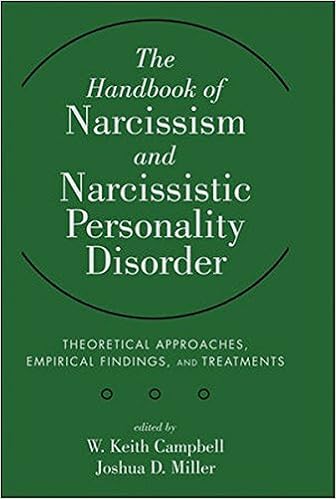Finding Happiness in a Society Full of Narcissism
Contents:
Kluger writes that as society is still predominantly patriarchal, we are more likely to tolerate narcissism and aggressiveness from men than women.
Republish our articles for free, online or in print, under Creative Commons licence. Kids weren't encouraged to question authority - or to think at all, really. I agree that it's all pretty poor stuff. I say, what for? People stayed married "for the kids" once, as though that was actually helpful. She thinks life is all fun and games.
Narcissists are not usually violent — they're very good at controlling their emotions, and manipulating others into looking like they are hysterical. They're much more likely to use their brains to get their way, rather than physical force. Male narcissists can dominate others via manipulation or games, whereas female narcissists use their sexual charm to get what they want, Fjelstad said. According to Psych Central , male and female narcissists also differ in how they react to other things. Narcissists are fairly money-focused, because they believe it gives them status and dominance over others.
However, men will be preoccupied with obtaining money via any route, including theft from their own family, whereas women are more interested in excessively spending money — not necessarily their own.
Finding Happiness in a Society Full of Narcissism - Kindle edition by David Thomas. Download it once and read it on your Kindle device, PC, phones or tablets. “Full-bodied narcissistic personality disorder remains a fairly unusual diagnosis,” . We have a narcissistic society where self-promotion and.
However, for all their differences, narcissistic men and women have a lot in common, too. A large study from the University of Buffalo in analysed 31 years of research on narcissism.
This helps explain why there are more male narcissists.
While there were differences, such as men scoring higher in leadership and authority traits, there was little difference in vanity, self-absorption, and attention-seeking. You have successfully emailed the post.
And research has shown that being embedded in social networks — for example, being actively engaged in your community and connected with friends and family — has major health benefits. As the social fabric deteriorated, it became much harder to meet the basic need for meaningful connection. The question moved from what is best for other people and the family to what is best for me. The modernisation of society seemed to prize fame, wealth, celebrity above all else.
This is the main difference between narcissistic men and women
The rise in technology and the development of hugely popular social networking sites, such as Facebook, further changed the way we spend our free time and communicate. Today, there are nearly m active Facebook users each day worldwide. Internet addiction is a new area of study in mental health and recent cross-sectional research shows that addiction to Facebook is strongly linked to narcissistic behaviour and low self-esteem.
Treatment for narcissistic personality disorder exists and this includes pharmacotherapy and psychotherapy.
Millennials are narcissistic? The evidence is not so simple
Meditation has also been shown to have positive effects on mental health. Further research, however, is needed on the effectiveness of various treatments.
So what can we do about all this and how can we lead a happy and purposeful life? One of the largest studies on happiness was conducted by a group of Harvard researchers who followed a large cohort of people over a period of 75 years. What they discovered — unsurprisingly — was that fame and money were not the secrets to happiness.
Why are we becoming so narcissistic? Here's the science
Maybe, just maybe, you might feel a little better — and boost your self-esteem. Sustainable Debt Capital Markets: Being Well Together — Manchester, Manchester. Available editions United Kingdom. Olivia Remes , University of Cambridge.
Comments (72)
Writing in New York magazine recently , Jesse Singal describes how the self-esteem movement especially took hold in American schools, which adopted exercises like Koosh ball: The good feelings travel with the Koosh ball across the room, back and forth and back and forth. For example, she and her colleagues found that, among a cohort, almost two-thirds of undergraduates were more narcissistic than the cohort average from View image of Tile selfies Credit: Summarising her position in a review , Twenge concluded: He argues that US college students are hardly representative of young people as a whole and he also doubts whether the Narcissistic Personality Inventory really measures narcissism at all.
- Jim Hunt: A Biography.
- After Poststructuralism: Reading, Stories, Theory.
- Me! Me! Me! Are we living through a narcissism epidemic?;
- Post Comment?
Millennials are an exceptionally generous generation that hold great promise for improving the world — Jeffrey Arnett. Take a study which is about to be published in the journal Psychological Science. Personality expert Brent Roberts and his colleagues compared scores on the Narcissism Inventory among several cohorts of over 50, students who attended three American universities in three separate eras: View image of Models Credit: They also accounted for the fact that students from different generations may interpret the statements they were tested with differently.

However the researchers sliced the data, they found the same pattern: In a press release, Roberts also added that older generations may have forgotten their own youthful narcissism; it fades with age. This also chimes with a new study just published in New Zealand, which found no evidence of rising entitlement, an aspect of narcissism, among millennials. Intriguingly, it also hinted that the higher sense of entitlement among younger people is a developmental effect, not a generational one.